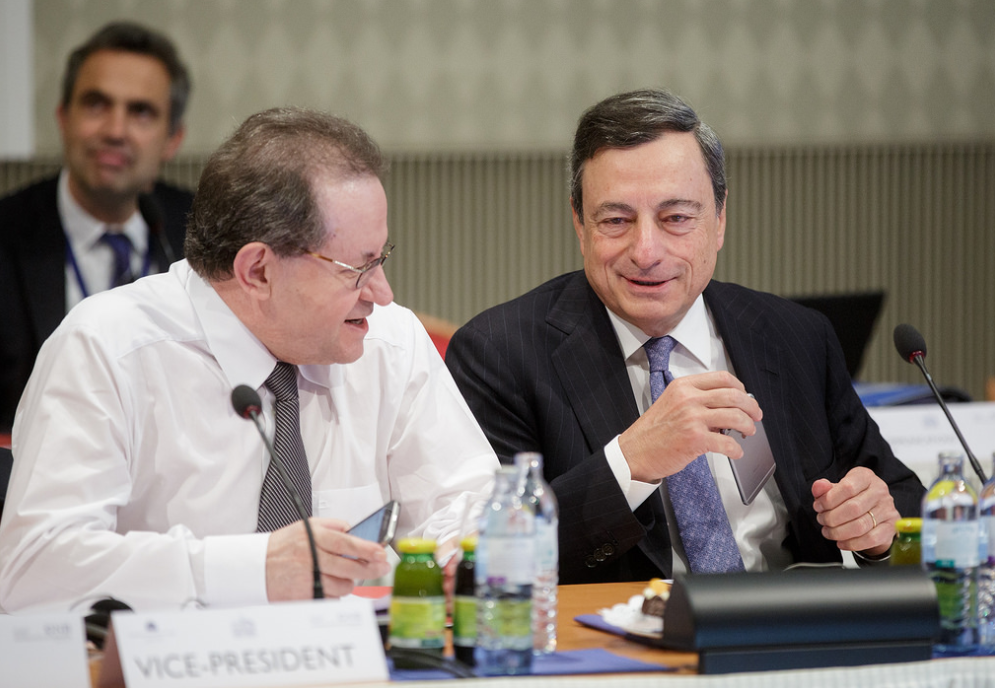ECB president Draghi quoted in the 2017 Annual Report 9 April
- recent stock market slide has not had significant impact on broader financial conditions
looking ahead, we expect the pace of economic expansion to remain strong in 2018. While we remain confident that inflation will converge towards our aim over the medium term, there are still uncertainties about the degree of slack in the economy.
a patient, persistent and prudent monetary policy therefore remains necessary to ensure that inflation will return to our objective.
Full report here but nothing really that we don't already know.
ECB VP Constancio meanwhile is currently delivering the report to an EU parliamentary committee in Brussels as I warned in an earlier post.
In his introductory remarks he says:
- In 2017, the euro area growth momentum became increasingly strong and broad-based. Inflation, on the other hand, remained subdued overall. It was - and still is - expected to rise only gradually over the medium term. Against this background, and reflecting the need to exercise patience, persistence and prudence in designing our monetary policy course, we recalibrated our monetary policy measures. This recalibration preserved the ample degree of monetary accommodation required to secure a sustained return of inflation rates towards our aim.
- In early 2017, the recovery of the euro area economy was steadily firming, but risks to our outlook were still tilted to the downside. By mid-year, the growth momentum had strengthened further, and output was expanding somewhat faster than previously expected. The probability of very adverse scenarios, such as those related to deflationary risks, had largely vanished. We therefore adjusted our forward guidance and removed the reference to possible further interest rate cuts.
- Later in the year, the unabated growth momentum offered reassurance that inflation was gradually converging towards our aim. Nevertheless, price developments continued to be subdued and underlying inflation measures had yet to show convincing signs of a sustained upward trend. This was the context for our decisions in October. In particular, we announced that we would scale down the intensity of our net asset purchases to a monthly pace of €30 billion, starting in January this year. At the same time, we extended the intended horizon of our asset purchases until the end of September 2018, or beyond, if necessary, and in any case until the Governing Council sees a sustained adjustment in the path of inflation consistent with its inflation aim. Moreover, we decided to extend the fixed rate tender procedures with full allotment, at least until the end of 2019 and reiterated our forward guidance on the key ECB interest rates and on our reinvestment policy.
- Throughout 2017, our monetary policy measures continued to support borrowing conditions for firms and households, thereby strengthening credit flows across the euro area. Considering all the measures taken between mid-2014 and those decided upon in October 2017, the overall impact on euro area real GDP growth and inflation is estimated, in both cases, to be around 1.9 percentage points cumulatively for the period between 2016 and 2020.
He concludes:
"One of the key lessons from the crisis was that the ECB's monetary policy measures and the policies needed to address challenges in the financial sector were complementary. More efficient and stable banking and financial markets will further improve the efficiency of monetary policy transmission channels and thus support the ECB's policies in the coming years.
It is therefore essential that we make further progress on the banking union and capital markets union. In order to achieve this, I trust that the strong relationship between the European Parliament and the ECB, to which I can attest after my eight years' experience, will continue to play a positive role."
EURUSD 1.2319 still underpinned with EURGBP clinging onto 0.8700.

2017 ECB Annual Report out today



